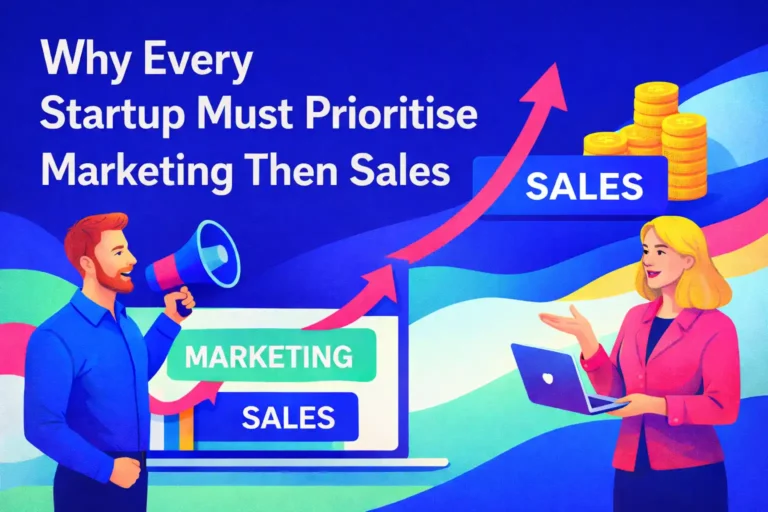Selling B2B Tech is Hard…
Almost every B2B tech startup will, at some point in its early-stage and growth years, hit a sales flatline. The fear of sales stalling is very real, especially for startups that are self-funded and don’t have the extended runway protection that investment rounds can provide. This challenge is almost an inevitability for all small tech firms to address at some stage in their journey. There could be unforeseen market conditions, a product or partnership could fail, or, more than likely, it is a circumstance of your own making. The real reasons why many startups hit a sales wall, just when they thought everything was going so well, are worth considering in more detail. B2B tech sales is the single hardest thing a startup must do and learn to excel at. Along with building a brand and demand generation, sales is one of the investment priorities founders must respect.

Early Bloomers Can Be Quick to Wither
Startups often begin with an electrifying energy, driven by passionate founders and a founding team eager to bring a ground-breaking idea to market. The initial focus is on solving a problem, developing a product and finding the first few customers. During these early stages, the startup’s core business is clearly defined, and everyone is aligned around a single common goal. Maintaining this drive and energy to sustain the growth trajectory over the foundational years is key to success. However, as the company starts to grow, it can be easy for founders to get lulled into a false sense of security, allowing themselves to be distracted by new ideas, emerging markets and potential expansions. This shift in focus, if done too soon and at the expense of a promising but still precariously young business, can lead to dangerous outcomes. It typically results in a humbling scenario when sales reach a growth ceiling, as revenue flatlines and progress stalls. Understanding why this is happening and how to prevent it could save your business.
The Captivating Allure of New Ideas
Innovation is the lifeblood of startups. Founders are typically visionary individuals who thrive on new ideas and the potential to disrupt markets. While this innovative spirit is essential for the birth of a startup, it can also become its Achilles’ heel. Once a startup has some initial traction, the temptation to chase new ideas and diversify can be strong. Founders might see opportunities in adjacent markets or entirely different sectors and feel compelled to expand or even pivot prematurely. However, this hot potato approach diverts attention and resources away from the core business, just as it was finding its feet. What is needed in these situations is not another round of blue-sky thinking, but a laser-sharp focus on executing the original strategy, with possibly some investment to help fund growth and continue product development to reach its full potential.
Walking Blind
When a founder loses sight of their original vision, perhaps even becoming a little arrogant to think what they are doing is easy, they are signalling that they take their early success for granted. Marketing effectiveness and good sales conversion made it look that way, but it was never easy; you just did simple things right. Never be fooled that early success is anything but a honeymoon period until you hit the next and inevitable rocky patch, because it will happen. This can manifest when receiving poor advice, either from the wrong people or your ego. Generally, a first-time tech founder is more likely to fall into this trap before learning an important yet painful lesson. Only when sales start to dry up do they begin to realise just how hard it really is to sell tech solutions to business customers and that taking their eye off the ball, even for a proverbial minute, is already too long.
Cash is Still King
It may sound obvious, but all businesses need a healthy cashflow to survive, and startups are no different. Ignoring the need to be able to meet financial obligations, such as payroll, will lead to severe issues. Early-stage businesses are in a delicate phase of their existence and must hire and spend within their means or risk running out of money. Fixing the sales conversion issue must be the priority, as this provides the means to pay the bills for another day. Sadly, deluded and arrogant founders might blindly plough on building a bigger problem before applying the brakes and can be their own worst enemy. This is where self-awareness and listening to the wider team, rather than just one or two confidants, would help. The biggest lesson to learn is that you must always continue to focus by avoiding unnecessary distractions and being relentless in execution on the core business.
Focus FFS!
When founders shift their focus to shiny new toys, ventures or markets, the core business will suffer; it’s an inevitability. The original product or service that brought in the first customers may no longer receive the attention it needs for refinement and improvement. Sales efforts that were once intense might wane as the team gets pulled onto new projects. This can lead to a decline in customer satisfaction, reduced product quality and ultimately the feared stagnation or decline in sales. The initial momentum that your startup had worked so hard to build can quickly dissipate if the core business is neglected. Do this at your peril.
Fragmented Sales Efforts
A key component of any successful startup is a strong, integrated and cohesive sales and marketing engine. In the early stages, the sales team, often including the founder, is deeply committed to selling the core product. They understand the market, the customers and the value proposition intimately. No one else could understand the product and sell it better than a tech founder. However, as the focus shifts to new ideas, sales efforts can become fragmented. The team may start to split its attention between the original business model and new initiatives, leading to diluted efforts and reduced effectiveness. This lack of consistency will confuse employees and customers alike, weakening the market position.
The Myth of Diversification
Diversification can be a smart strategy for more established companies, that have the resources to maintain stable growth and revenue streams. However, it’s a high-risk endeavour for pre-scaleup businesses that have established product-market fit but are still very much in the early phases of establishing themselves. Founders might believe that expanding into new markets or launching non-complementary products will accelerate their success, but in most cases, the precise opposite is true. Without solidifying your position in your existing and core market, you risk spreading the business too thin. Diversification requires significant investment in terms of time, money and resources. An early-stage startup has none of these to spare.
Stick to the Plan
B2B tech startups experience sales flatlines or dips in revenue when founders take their eye off the ball and get distracted by new ideas, markets or products (shiny new toys) before they grow the business enough for it to sustain a diversification strategy. Rather than getting sidetracked, founders would do better to focus on how to scaleup the core business, by developing the product and investing in marketing and sales. Imagine this scenario: you went to all the trouble of creating an innovative startup to challenge the status quo, winning your first big customers, building a multi-million-dollar revenue business and recruiting a high performing team over several years, only to self-sabotage the entire operation. As you let the startup get dragged down by the distractions, you put everything on the line, including the livelihoods of everyone involved. Why would any right-minded person do that?
You may want to read: “Top 10 Ways Tech Founders Kill Their Culture.”






